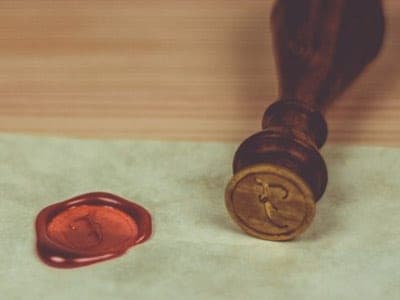This post is also available in:
![]() 繁體中文 (Chinese (Traditional))
繁體中文 (Chinese (Traditional)) ![]() 简体中文 (Chinese (Simplified))
简体中文 (Chinese (Simplified))
Is Company Chop or Seal a Necessity for a Hong Kong Company?
 Executing legal documents and contracts are a very common occurrence in a business. But does your Hong Kong company need a company chop or company seal to get it done? Or will a signature suffice?
Executing legal documents and contracts are a very common occurrence in a business. But does your Hong Kong company need a company chop or company seal to get it done? Or will a signature suffice?
What Is a Company Chop?
In general terms, a company chop is the company’s rubber stamp. “Chop” is a term with colonial Indian English origins, and these are unique to a few jurisdictions, including Hong Kong.
The Purpose of a Hong Kong Company Chop
A Hong Kong company chop is like your business’s signature. Which means these company chops are not exactly a necessity. You can either use a Hong Kong company chop or your own signature and it works the same way.
Company chops are more important in Mainland China. Company chops in Mainland China are registered with the government. If your Hong Kong company does a lot of business with China, then you’ll need a Hong Kong company chop for formality.
While not a necessity, that doesn’t mean these Hong Kong company chops are completely unnecessary. Chops can be useful as proof of intention for legal relations. It can also play an important role in confirming your company’s capacity for contracts, and acceptance of contract terms.
What About a Hong Kong Company Seal?
After the New Companies Ordinance was enforced on March 2014, company seals are no longer a necessity. Should you choose to have a Hong Kong company seal anyway, you can. However, you must ensure that your company seal is metallic with the business name legibly engraved. The seal must be applied in accordance with your Articles of Association.
Section 127(i) of the Hong Kong Companies Ordinance allows businesses to execute a document under their common seal. Should you choose not to keep your Hong Kong company seal, you may execute documents via:
- Signing by the director (if your company has only one director); or
- Signed by both directors (if there is more than one director), any of the directors; or
- The Company Secretary
The TS Office System Ltd v. Wing Kee Products Ltd
This is one of the more infamous examples that raises the question of a Hong Kong company chop’s importance. In the TS Office System Ltd v Wing Kee Products Ltd case, the legal implications of a company chop were examined by the court. The receptionist affixed the company’s chop to an order form amounting to HK$230,952 worth of printer toner. The court examined if the company chop was enough to constitute as legally binding.
The receptionist was unaware that one box of toner was not delivered together with the shipment. The sales confirmation, invoice and delivery forms were affixed with the company chop and returned to the contractor. However, when the mistake was discovered, the company refused to return or pay for the missing goods. The company went on to claim that the receptionist was acting on the company’s behalf by law when she affixed the chop. The opposing company however, disputed the claims saying the receptionist had “no authority” to bind contracts in this case.
Eventually, the appeal was accepted by the court. The court ruled that the company was not legally bound to the contracts, chopped on behalf by the receptionist. This case serves as a gentle reminder for companies to be mindful as to how their chops are being used.


